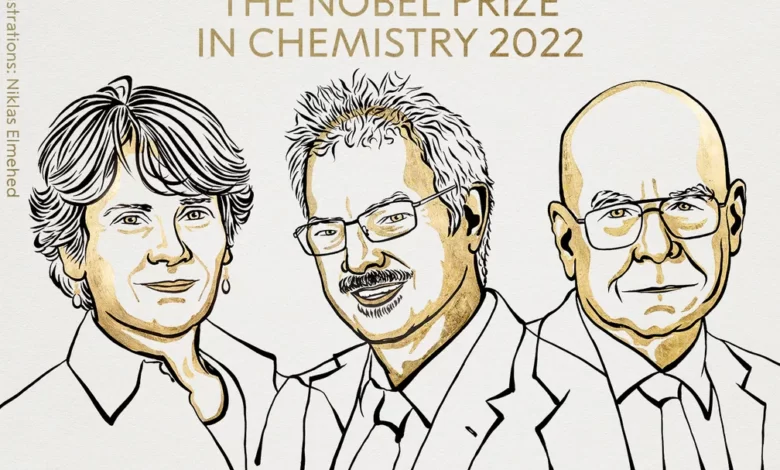2022 Nobel Prize in Chemistry goes to trio that developed creative tool for building molecules
Laureates in Literature and Peace will be handed out later this week; the Economics will be released next Monday (10).

Carolyn R. Bertozzi, Morten Meldal and K. Barry Sharpless are the winners of the 2022 Nobel Prize in Chemistry, the Royal Swedish Academy of Sciences announced on Wednesday (5).
Bertozzi and Sharpless are Americans. Meldal is Danish. So far, Bertozzi is the only woman to have won the award this year. Sharpless, on the other hand, is receiving a Nobel for the second time (he had already received the same award in 2001, for other work in the area).
They will share the prize which totals 10 million Swedish kronor (about R$ 4.8 million).
The group won the Nobel Prize for creating a creative tool for building molecules with “the development of click chemistry and bioorthogonal chemistry”.
Among many other practical applications, the trio’s work has allowed cancer treatments to be more targeted , the Nobel committee said.
The findings “laid the foundation for a functional form of chemistry,” the committee added.
Last year, the Chemistry award went to two scientists who developed a tool for building molecules . Since 1901, more than one hundred people have been laureates. The scientific distinction was not awarded only on eight occasions: in 1916, 1917, 1919, 1924, 1933, 1940, 1941 and 1942.
By 2021, however, of the 187 people awarded the Nobel Prize in Chemistry, only 7 were women. Among them, Polish scientist Marie Curie, the first woman to win a Nobel.
Nobel 2022
The degree in Medicine was the first to be announced , on the second (3). The Physics one was released on Tuesday (4).
The Literature and Peace awards will be handed out later this week; the degree in Economics will be announced next Monday (10th). See the schedule:
- Medicine : Monday, October 3
- Physics : Tuesday, October 4th
- Chemistry : Wednesday, October 5
- Literature : Thursday, October 6
- Peace : Friday, October 7
- Economy : Monday, October 10
See below for questions and answers about the award.
What is the Nobel Prize?
The laurel was created by chemist and entrepreneur Alfred Nobel. Inventor of dynamite in 1867, the Swede donated most of his fortune in his will to create prizes for physics, chemistry, medicine, literature and peace (the economics prize was created years later).
The document said that the prizes should be awarded “to those who, during the previous year, have conferred the greatest benefit on humanity.”
However, nowadays, as explained by Juleen Zierath, a member of the Karolinska Institute -the jury for the Nobel Prize in Medicine-, this rule is no longer taken to the letter.
“You may have made this discovery at a very early stage in your research career, or you may have made this discovery at a very late stage in your research career,” she points out.
How is the prize chosen?
Every year, the Nobel Committee sends a nomination request to members of the scientific community.
This means that some eligible candidates receive a special invitation to submit their names. Without this invitation, no postulant can compete for the prize.
“You cannot nominate yourself, but members of scientific communities, deans of medical schools [in the case of the award in the field], former Nobel laureates and others who work in the wider scientific field and who have received this request can make an indication,” says Zierath.
How many people can share the same prize?
Up to three people can share a Nobel Prize, or one organization can win the Peace Laureate.
The Nobel Foundation, responsible for carrying out the wishes of its founder, points out that this rule is described in Alfred Nobel’s will.
/i.s3.glbimg.com/v1/AUTH_59edd422c0c84a879bd37670ae4f538a/internal_photos/bs/2022/w/B/DQD1cTTAudjgMIXIKsjg/ap22277210668315.jpg)
The Nobel Prize Medal. — Photo: Angela Weiss/Pool Photo via AP, File
“In no case can the value of the prize be divided between more than three people”, highlights an excerpt from the document. Some researchers, however, criticize this choice and claim that scientific discoveries today are much more collective: a work of several researchers.
Can the laurel be awarded posthumously? Is there an age limit?
No, a Nobel Prize cannot be awarded posthumously.
Despite this, the Foundation emphasizes that, since 1974, if the recipient of the award dies after the announcement, the laurel can still be awarded.
About the age limit, the prize also doesn’t have a rule about it.
“What I would say is that, most of the time, it takes many years for the scientific field to recognize that the discovery you made is a distinction that should be considered for a Nobel Prize . So sometimes you have to be quite patient. “, emphasizes Zierath.





